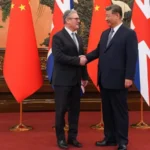A routine flight turned into a devastating tragedy for Colombia on Wednesday, as a small passenger plane crashed near the Venezuelan border, killing all 15 people on board.
Among the victims were government officials, including a prominent lawmaker and a congressional candidate, leaving the nation in shock.
What began as a short domestic journey quickly became a heartbreaking event that has gripped communities and families alike.
Flight Details and Disappearance
The ill-fated Beechcraft 1900, operated by Colombia’s state-owned airline Satena, departed from Cúcuta at 11:42 a.m., heading to Ocaña on what was supposed to be a brief 40-minute flight.
But only 12 minutes after takeoff, the aircraft vanished from radar.
Airport data later revealed a sudden drop in altitude just 11 minutes before its scheduled landing at Aguas Claras Airport, raising urgent alarms.
Satena confirmed hours later on X (formerly Twitter) that the plane had “suffered a fatal accident,” with no survivors among the 13 passengers and two crew members.
Remembering the Victims
The crash claimed the lives of several notable figures, including Diógenes Quintero, a member of Colombia’s House of Representatives, and congressional candidate Carlos Salcedo Salaza.
Quintero’s political party expressed its profound grief, praising his dedication to public service and commitment to his community.
Other passengers identified include María Álvarez Barbosa, Rolando Penaloza Gualdron, María Díaz Rodríguez, Maira Avendano Rincon, Anayisel Quintero, Karen Parales Vera, Anirley Julio Osorio, Gineth Rincon, Natalia Acosta Salcedo, Maira Sánchez Criado, and Juan Pacheco Mejía.
The crew members were Captain Miguel Vanegas and Captain Jose de la Cruz.
Satena released a statement offering “our most sincere condolences” and emphasizing their solidarity with the families affected by the tragedy.
The airline noted that the plane’s emergency beacon did not activate, though no cause of the crash has yet been disclosed.
Search Efforts in Remote Terrain
The last known signal from the aircraft came from Colombia’s Catatumbo region, a remote, mountainous jungle notorious for dense vegetation and challenging visibility.
The area has also seen ongoing violence and is known to be controlled in parts by armed groups such as the National Liberation Army (ELN).
Colombian authorities launched extensive search operations, involving the Aerospace Force, National Army, and charter company Searca, covering the plane’s expected flight path.
The government established a Power Management Unit (PMU) to coordinate rescue and recovery efforts.
By late afternoon, reports confirmed that the wreckage had been located in Curásica, near the Venezuelan border.
Tragically, all onboard were confirmed dead.
Heavy rains in the area, combined with recent local violence including targeted killings and kidnappings, made the search operation especially challenging.
Heartbreaking Scenes at the Crash Site
Local media released images showing the destroyed fuselage and rescue personnel recovering victims.
Bystanders and medical teams worked together amid armed guards overseeing the site, and members of Quintero’s campaign team were seen visibly grieving.
Personal belongings and luggage from passengers were also recovered at the crash scene.
Satena’s Role and Next Steps
Satena plays a crucial role in connecting Colombia’s capital and other large cities with small regional airports across the country.
The airline pledged to provide humanitarian support to the victims’ families and vowed full cooperation in the investigation.
Authorities are now working to determine the exact cause of the crash, but no official explanation has been released.
Investigators will examine flight data, the aircraft’s condition, and environmental factors, while families and communities continue to mourn the devastating loss.
Share on Facebook «||» Share on Twitter «||» Share on Reddit «||» Share on LinkedIn




